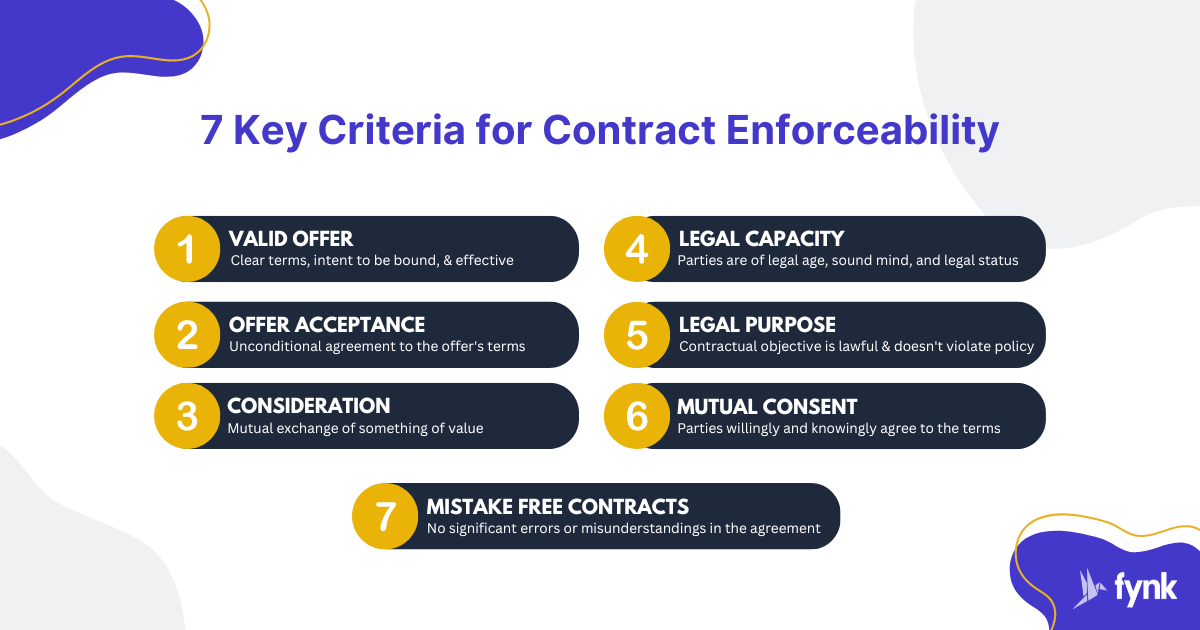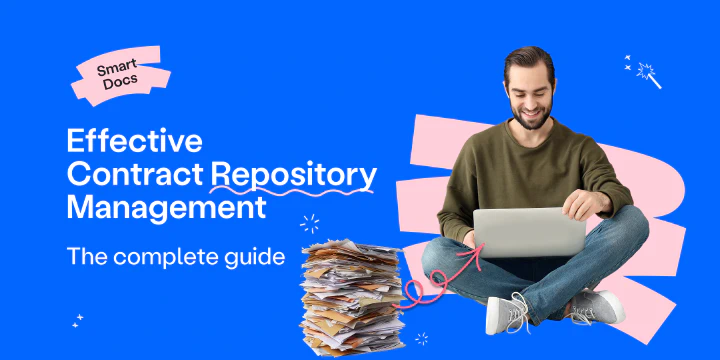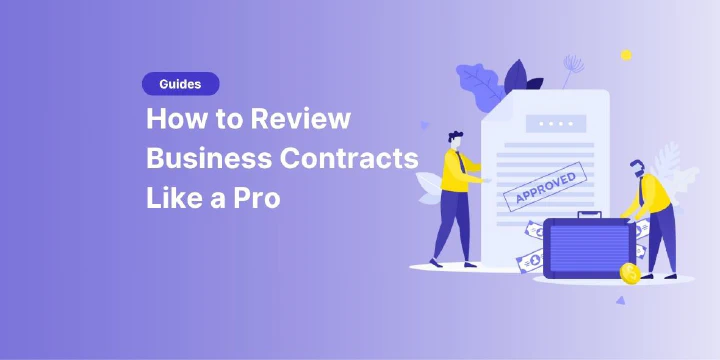What Makes a Contract Enforceable? 7 Important Criteria
An enforceable contract is a valid, legally binding agreement between parties that can be upheld in a court of law. It needs to fulfill several conditions, such as a clear offer and acceptance, mutual consent, consideration, and intention. In this guide, we’ll go over all the necessary requirements for a contract to be considered enforceable, along with an example to illustrate the concept.

What is an Enforceable Contract?
An enforceable contract is a legally binding agreement between parties that includes an offer, acceptance, consideration, legal capacity, legal purpose, and mutual consent while it’s free of any considerable mistakes. Enforceable contracts can be used in the court of law in case a party fails to meet the contract requirements.
These contract enforcement criteria make sure that you and the other party are agreeing to the terms because you both want to, exchange something valuable and are able to understand and meet your responsibilities.
Picture this: you’re a freelance graphic designer who landed a dream project with a new client – designing a logo and branding materials for their startup. You both agree on the deliverables, timeline, and payment terms. But have you considered what happens if the client suddenly changes their mind midway through the project? Or what if they refuse to pay upon completion?
Without a legally enforceable contract, you might find yourself in a frustrating and costly legal battle.
Enforceability is the cornerstone of any contract. It means if one party fails to uphold their end of the agreement, the other party can seek legal remedies to enforce the terms.
In the case of the freelancer, a written agreement with clear terms, including project scope, revision limits, payment schedule, and ownership of intellectual property, along with signatures from both parties, would be considered an enforceable contract. This means you could take your client to court, where a judge could order them to pay the agreed-upon fees, compensate you for additional work, or even uphold your ownership rights to the designs.
However, verbal agreements or vague emails often lack the necessary details and proof to hold up in court, making them less reliable as enforcement contracts.
What Makes a Contract Enforceable?
For a contract to be enforceable it must have seven important criteria:


1 . Valid Offer
To draft an enforceable contract, you should pay attention to four important criteria: the clarity of the offer, your intention to be bound, and when the offer becomes effective and expires.
- Clear and Definite Offer: Your offer must clearly state key details like price and item. Saying you’re open to negotiation isn’t enough. When preparing to draw up a contract, ensure all essential details are clearly outlined.
💡 Good to Know: A sales contract can be valid without a set price if both parties agree to leave it open.
Intention to be Bound: Usually, it’s clear if a proposal is binding or not, but if unclear, it’s based on what a reasonable person would think. Proposals sent to many people, ads, and price lists are typically seen as invitations to negotiate, not offers. However, some ads, like reward offers, can be binding.
When the Offer Becomes Effective: Your offer becomes effective when the recipient can accept it. For verbal offers, this is when they hear it. For written offers, it’s when they receive it (for example a letter in their mailbox). The offer is ineffective if they get a withdrawal notice before or at the same time as the offer.
When the Offer Expires: The offer expires if rejected or not accepted in time. Or, if it passes a specified time or after a reasonable time if no time is set.
🧠 Did you Know? Some legal systems allow acceptance even if you or the recipient die or become incapacitated, while others don’t, depending on the contract’s nature.
2. Offer Acceptance
Typically, acceptance is communicated directly to the offeror, either through a clear statement or actions indicating agreement to the offeror’s terms. Sometimes, the fact that you started fulfilling the contract is considered as acceptance, and in cases like this, the acceptance can be removed from the contract.
However, silence generally doesn’t indicate acceptance unless there are special circumstances or specific laws that say otherwise.
If your acceptance varies from the offeror’s terms, it’s usually seen as a counteroffer rather than acceptance.
❗Important: Time is a very important component for a contract to be enforceable; if your acceptance arrives late, it might be seen as a new offer instead.
3. Consideration
Consideration in the legal context is exactly what the word says: It’s what both parties consider to give up or promise to give up in exchange for the other party’s promise or performance. It’s the main agreement of the contract.
For example, if you promise to pay someone €500 in exchange for them delivering a computer to you, your promise to pay €500 is your consideration for receiving the computer.
For a contract to be enforceable, both parties must provide mutual consideration. Also, the consideration must have some value in the eyes of the law. It can be either a physical good, a service, or even a promise to act in the future.
❗Important: Your consideration must be legally sufficient, meaning it cannot be something illegal or against public policy. It also cannot be something the party is already legally obligated to do.
4. Legal Capacity
A contract is only enforceable when both parties are “capable” of entering into a binding agreement based on what the law indicates. This is known as legal capacity.
There are three main criteria to consider a person legally competent to enter a contract.
- Age: If you are under the age of 18 (or the age of majority in your country/jurisdiction), you may lack the legal capacity to enforce a contract. Contracts made by minors are usually voidable, which means there’s an option to cancel them when parties reach adulthood.
- Mental Competence: If parties are not of sound mind due to illness, disability, or intoxication, they may lack the capacity to enter into a contract.
- Legal Status: Some individuals may have limited ability to make binding agreements. For example, a bankrupt person might need special approval to sign contracts, and someone under guardianship might need their guardian’s permission
5. Legal Purpose
You can only enter a legally enforceable agreement that its purpose is lawful and not against any principles of morality introduced by the legal system.
For example, a contract to sell illegal drugs would have no legal purpose and therefore would not be enforceable in a court of law. Similarly, fraud, gambling in jurisdictions where it’s illegal, or activities that harm public interest would typically be considered unenforceable due to their illegal purpose.
6. Mutual Consent
Mutual consent means both parties agree on the essential terms and purpose of the contract, which is enforceable by law. It requires you and the other party to willingly, voluntarily, and knowingly agree to the same terms without any significant misunderstandings. After all, it’s always illegal to force someone to do something.
Based on the principle of “freedom of contract“, you have the right to negotiate and agree upon terms that best suit your needs, as long as these terms comply with the law and do not violate public policy.
7. Mistake Free Contracts
In contract law, mistakes typically do not automatically make a contract unenforceable. If you enter into a contract under mistaken assumptions or expectations, such as misjudging market conditions or the value of goods, you generally cannot cancel the contract solely on those grounds.
However, there are exceptions where a significant mistake caused by the other party’s deceit or misrepresentation might allow you to seek cancellation, potentially hindering the enforcement of the agreement.
✨ Pro Tip: Including a “Contract Severability Clause” in your agreement can also safeguard individual terms in the event that some portions of the contract are deemed unenforceable.
For example, if you sign a contract to buy a house, believing it has no major issues because the seller lied about its condition, you might have a reason to cancel the contract. Legal systems also check if the mistake affects key aspects of the agreement or makes it unfair.
Example of an Enforceable Contract
Imagine the following scenario:
Alice, the owner of an IT consulting firm, wants to hire Bob, a freelance software developer, to create a custom software application for a client. They agree on the following terms:
Alice offers Bob €10,000 upon successful completion of the software within 3 months. She communicates this offer through a detailed proposal outlining the scope, timeline, and payment terms.
Bob accepts the offer explicitly via email, indicating his agreement to all terms and conditions.
The consideration is mutual: Alice promises payment, and Bob promises to develop and deliver the software as specified.
Both parties have the legal capacity to enter into the contract. Alice is competent to operate her business, and Bob is a skilled software developer.
The purpose of the contract, software development services, is lawful and does not violate any legal principles.
There is clear mutual consent between Alice and Bob regarding the essential terms and obligations of the contract.
The contract is free from significant mistakes or misunderstandings that could render it unenforceable.forc
As you can see, all seven important criteria are met, showing exactly what constitutes a valid contract.
To easily draft and create enforceable contracts and access many templates, try fynk for free! Your all-in-one contract management software.
Now Over to You
No contract is like the other and it’s almost always impossible to cover every aspect of the deal. However, by paying attention to several critical factors outlined in enforceable contract law, you can avoid further complications and make sure that your contacts are actually legally enforceable agreements.
Please keep in mind that none of the content on our blog should be considered legal advice. We understand the complexities and nuances of legal matters, and as much as we strive to ensure our information is accurate and useful, it cannot replace the personalized advice of a qualified legal professional.
Table of contents
Want product news and updates? Sign up for our newsletter.
Other posts in Contract-Management

SaaS contract management explained for buyers and vendors
If you work in SaaS, you know how quickly contracts can pile up. Each one comes with its own terms, renewals, …

The Complete Guide to Effective Contract Repository Management
A contract repository is where every agreement your business depends on finally finds its place. No cluttered …

How to Review Business Contracts Like a Pro in 2026
When it comes to business contracts, what you don’t catch can hurt you. That’s why reviewing a business …
Contracts can be enjoyable. Get started with fynk today.
Companies using fynk's contract management software get work done faster than ever before. Ready to give valuable time back to your team?
Schedule demo

